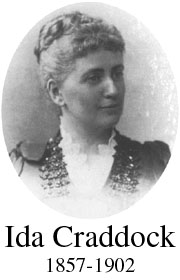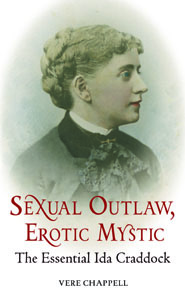Note: this and other diary entries, letters, and essays by Ida Craddock are included in the new book, Sexual Outlaw, Erotic Mystic: The Essential Ida Craddock by Vere Chappell.
HEAVENLY BRIDEGROOMS:
AN EPILOGUE
By Ida Craddock
In January of 1895, Ida Craddock recorded the following account immediately after the writing of "Heavenly Bridegrooms." This account was intended only for the man who had financed her during her researches in the British Museum.
Thursday, January, 3rd, 1895:
I have not been making entries in my spiritual diary lately, because
- I have been going to bed too late to get much of anything;
- Iases seems to have been choosing to use what psychic strength I had to issue instructions regarding the work on "Heavenly Bridegrooms
In some cases this has been a great regret to me, as I have had to leave out one or two important arguments---for instance, arguments which would have included the phrase, "mental masturbation," a term which explains, I have reason to believe, much that goes under the name of "spirit communications" in these matters. Then, again, I begged, and begged, and begged that I might explain the exact English meaning of the Roman Catholic phrase, "congressus cum daemonis," but Iases objected every time, insisting that it was risky in this edition. You will observe, by the way, that the phrase as I have here written it and also in the treatise, is "congressus cum daemonis" whereas, in speaking with you, I have always used "daemonibus."
I have changed the expression for the following reason--- which as Iases has forbidden me to put it in the treatise, you may be interested in seeing here. I have never seen this phrase, in any of the books which I have so far come across, and have heard it only once---from a Catholic priest with whom I was discussing my experience, and who was trying to frighten me by telling me that my husband was a demon. As I didn't believe in demons, and didn't believe that any evil-minded person, who had passed to the world beyond the grave, had power to communicate, much less, harm me, I simply laughed at what he said. He afterwards said to a mutual acquaintance that I was --- I forget the exact word he used, but it meant "invincible, unbreakable."
Well, he at first told me there was a great deal of literature written on the subject, my experience was nothing, as similar experiences had been known for centuries in his own church, and the whole thing was very evil; there had been enough written on the subject to fill the room where we then sat. At once I asked, eagerly, would he please tell me the names of some of the books, so that I could read up on the subject? This was more than he bargained for, and he at once changed his tactics, and tried to make me think that I had misunderstood him in this last remark; what he had meant to say was that all that had been said on the subject could easily be crowded into that room. And from that moment I could get nothing out of him save that my experience was by no means unique, and that it was entirely evil, and the work of a demon.
He several times used the phrase, "congressus cum daemonis" as the term applied by the Church to such unions. Afterwards I looked up the declension of the word "daemon," as it seemed to me there must be something wrong, grammatically speaking, about that phrase. As cum (with) governs the ablative, and his expression was "daemonis", which is the genitive, I concluded (rashly, as I am now convinced) that he had made a slip of the tongue, and that he must have forgotten his declensions, and have thought that "daemon", which is really a noun of the third declension, was a noun of the first declension, whose dative and ablative plurals end in "is". And so I always used it afterward, in speaking to you, as "Daemonibus". But when I came to write it out in my treatise, I saw there was still something wrong about it, for that would make the phrase literally "congress with demons" whereas a psychic usually claims congress only with One, and not with a plurality of spirits. But before this idea had struck me, I had set myself to work to look up every possible exception to "cum's" government of the ablative. I found, in a note, that sometimes the word, which 'cum' governs, is omitted, and only the genitive dependent on the missing word appears. So that the phrase "congressus cum daemonis" would be quite correct, provided some missing word were understood --- a word of an indefinite meaning, such as 'that pertaining to,' 'the things of', etc. this would make "congressus cum daemonis" mean literally, "congress with something belonging to a demon."
Do you see the exquisite nicety of that rendering? Evidently, the psychics to whom that term was applied, had experiences just like mine, in so far as the fact that only "something belonging to" the spirit --- i.e., his phallus --- materialized; so that their "congress" was literally with something 'belonging to' him. Compare this with what I have told of the two legends relative to Isis finding the pieces of her husband's body, in one case, all except the phallus, and in the other, none of the pieces except the phallus, from which solitary member she reconstructs the deceased husband. I did put in the legend of Isis, and wanted awfully to put in this about the "congressus cum daemonis," but Iasis wouldn't let me. The priest who used this phrase was a very intelligent man, with quite a passion for book study, so that, you see, it really is very unlikely he should make this grammatical slip --- in this language of all languages, which is the vernacular of the Catholic priesthood.
-- THE END --

